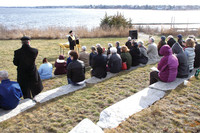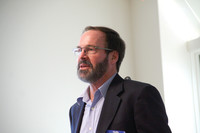If you could drive, areas that rival the Grand Canyon, Rocky Mountains and natural wonders of the world are only about 90 minutes from Rhode Island.
But once you got there, the majesty of these …
This item is available in full to subscribers.
We have recently launched a new and improved website. To continue reading, you will need to either log into your subscriber account, or purchase a new subscription.
If you are a current print subscriber, you can set up a free website account by clicking here.
Otherwise, click here to view your options for subscribing.
Please log in to continue |
|


If you could drive, areas that rival the Grand Canyon, Rocky Mountains and natural wonders of the world are only about 90 minutes from Rhode Island.
But once you got there, the majesty of these places wouldn’t be apparent. That’s because they’re underwater.
Jon Witman, a biology professor at Brown University, has dived on Cashes Ledge. He described the experience Saturday to an assembly brought together by the Rhode Island State Council of Churches and three other groups at Save The Bay offices on Fields Point to call for the permanent protection of Cashes Ledge and Coral Canyons and Seamounts. There was more than an appeal.
Following remarks inside, the group of church leaders and environmentalists joined outside for a blessing of the water led by the Rev. Andrew G. George, pastor of the Church of the Annunciation Greek Orthodox Parish of Greater Providence based in Cranston, which included chants and the distribution of holy water so people could bless their homes.
The wonder of creation and the power of the creator were themes throughout the first event of its kind calling on President Barack Obama to designate the offshore areas as marine national monuments.
Witman said the dive on Cashes Ledge was so inspiring that even though he had a number of tasks to perform for several minutes, all he could do was lie on his back and look up to the light filtering down through undulating strands of kelp.
“It’s like walking into the great cathedrals of the world,” he said.
Witman called the ledge the “jewel of the Atlantic” – it is located north of Cape Cod off the Maine shoreline – with an abundance of life. He said it is the only kelp forest on the continental shelf of the United States. Witman showed a video clip of scores of fish of different sizes and species.
But while teaming with life, Witman said there has been a noticeable reduction in the numbers of fish. Describing an area no bigger than a 12-by-12-foot room, Witman said in the late 1970s as many as 200 to 300 codfish would swim through the space in an hour. Now the numbers are down to six or seven fish. Witman said the ledge and the canyons and seamounts are “biodiversity hotspots” with as many as 35 species of corals and rich concentrations of life.
Katharine Deuel, senior associate for U.S. oceans at the Pew Charitable Trusts, said the ledge is about 530 square miles. She said it is protected from some fishing, such as bottom dragging. As a marine monument, all fishing would be prohibited. Deuel was not able to provide the economic impact of such restrictions, but thought it would be minimal. She thought there could be opposition to the designation from the fishing industry.
Yet it was the power of prayer, not politics, that the effort of the council of churches, Protect New England Ocean Treasures, Interfaith Oceans, and Creation Justice Ministries sought to invoke.
In his welcome Tom Kutcher, Narragansett Baykeeper with Save The Bay, talked about the “beautiful sacred critters.” He said they are more than a “resource” and that we have a responsibility to preserve and see that the cycle of life is perpetuated.
“When you’re doing God’s work, you’re unstoppable,” he said.
Looking out on the phalanx of waves driven by strong southerly wind beyond the Save The Bay conference room, the Rev. Don Anderson, executive minister of the state council of churches said, “We know and cherish this water. Let us thank God for that.” He said Narragansett Bay provides “recreation and reflection and so many things affecting our lives.”
“Good futures are possible when we act in responsible ways,” said Dr. Anita Schell, rector of Emmanuel Newport Episcopal Church and president of the Rhode Island Interfaith Power and Light. She said as stewards of God’s world it is our responsibility to preserve.
Sergei Kapral, executive committee member of Creation Justice Ministries and protodeacon of the national ecumenical leadership of the Orthodox Church in America, said the group comprises 100,000 congregations and 45 million people.
“I wish they all knew about it,” he said of the Justice Creation Ministries.
“Our job is to lift up creation,” he said. “Creation is our protector. Without it we’re not going to be saved.”
“Animals remember God,” he added, “we’re the ones who messed it up…Blessing means putting it back in relation with God as it should be.”
Remarks were also provided by Wayne Kezirian, commodore of the Edgewood Yacht Club, and state Rep. Arthur Handy.
In a prelude to the outdoor blessing that took about 30 minutes, George talked about the significance of water to the Greek Orthodox Church and the use of water to bless a home or business.
“Water is important. It gives us life. It is sacred,” he said.
Comments
No comments on this item Please log in to comment by clicking here